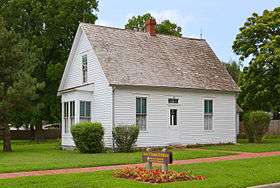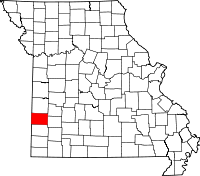Lamar, Missouri
| Lamar, Missouri | |
|---|---|
| City | |
 Location of Lamar, Missouri | |
| Coordinates: 37°29′37″N 94°16′20″W / 37.49361°N 94.27222°WCoordinates: 37°29′37″N 94°16′20″W / 37.49361°N 94.27222°W | |
| Country | United States |
| State | Missouri |
| County | Barton |
| Area[1] | |
| • Total | 5.43 sq mi (14.06 km2) |
| • Land | 5.12 sq mi (13.26 km2) |
| • Water | 0.31 sq mi (0.80 km2) |
| Elevation | 961 ft (293 m) |
| Population (2010)[2] | |
| • Total | 4,532 |
| • Estimate (2012[3]) | 4,514 |
| • Density | 885.2/sq mi (341.8/km2) |
| Time zone | Central (CST) (UTC-6) |
| • Summer (DST) | CDT (UTC-5) |
| ZIP code | 64759 |
| Area code(s) | 417 |
| FIPS code | 29-40376[4] |
| GNIS feature ID | 0720770[5] |
| Website | cityoflamar.org |
Lamar is a city and the county seat of Barton County, Missouri, United States.[6] As of the 2010 census, the city population was 4,532.[7] Lamar is well known as the birthplace of President Harry S. Truman.
Geography
Lamar is located at 37°29′37″N 94°16′20″W / 37.49361°N 94.27222°W (37.493676, -94.272111).[8] According to the United States Census Bureau, the city has a total area of 5.43 square miles (14.06 km2), of which, 5.12 square miles (13.26 km2) is land and 0.31 square miles (0.80 km2) is water.[1]
History
Lamar was laid out in 1856. It was named for Mirabeau B. Lamar, second President of the Republic of Texas.[9]
It suffered multiple attacks by rebels during the American Civil War.
Demographics
| Historical population | |||
|---|---|---|---|
| Census | Pop. | %± | |
| 1880 | 907 | — | |
| 1890 | 2,860 | 215.3% | |
| 1900 | 2,737 | −4.3% | |
| 1910 | 2,316 | −15.4% | |
| 1920 | 2,255 | −2.6% | |
| 1930 | 2,381 | 5.6% | |
| 1940 | 2,992 | 25.7% | |
| 1950 | 3,233 | 8.1% | |
| 1960 | 3,608 | 11.6% | |
| 1970 | 3,760 | 4.2% | |
| 1980 | 4,053 | 7.8% | |
| 1990 | 4,168 | 2.8% | |
| 2000 | 4,425 | 6.2% | |
| 2010 | 4,532 | 2.4% | |
| Est. 2015 | 4,361 | [10] | −3.8% |
| U.S. Decennial Census | |||
2010 census
As of the census[2] of 2010, there were 4,532 people, 1,866 households, and 1,202 families residing in the city. The population density was 885.2 inhabitants per square mile (341.8/km2). There were 2,099 housing units at an average density of 410.0 per square mile (158.3/km2). The racial makeup of the city was 94.5% White, 0.7% African American, 0.6% Native American, 0.3% Asian, 0.7% from other races, and 3.2% from two or more races. Hispanic or Latino of any race were 1.9% of the population.
There were 1,866 households of which 32.5% had children under the age of 18 living with them, 45.9% were married couples living together, 13.9% had a female householder with no husband present, 4.7% had a male householder with no wife present, and 35.6% were non-families. 31.2% of all households were made up of individuals and 17.7% had someone living alone who was 65 years of age or older. The average household size was 2.38 and the average family size was 2.96.
The median age in the city was 39.6 years. 25.8% of residents were under the age of 18; 8.2% were between the ages of 18 and 24; 22.3% were from 25 to 44; 24.2% were from 45 to 64; and 19.5% were 65 years of age or older. The gender makeup of the city was 46.6% male and 53.4% female.
2000 census
As of the census[4] of 2000, there were 4,425 people, 1,835 households, and 1,154 families residing in the city. The population density was 1,154.5 people per square mile (446.1/km²). There were 1,995 housing units at an average density of 520.5 per square mile (201.1/km²). The racial makeup of the city was 96.61% White, 0.18% African American, 0.61% Native American, 0.34% Asian, 0.14% Pacific Islander, 0.34% from other races, and 1.79% from two or more races. Hispanic or Latino of any race were 1.40% of the population.
There were 1,835 households out of which 32.0% had children under the age of 18 living with them, 48.2% were married couples living together, 11.4% had a female householder with no husband present, and 37.1% were non-families. 33.3% of all households were made up of individuals and 18.1% had someone living alone who was 65 years of age or older. The average household size was 2.35 and the average family size was 2.98.
In the city the population was spread out with 26.6% under the age of 18, 8.5% from 18 to 24, 24.9% from 25 to 44, 19.5% from 45 to 64, and 20.5% who were 65 years of age or older. The median age was 37 years. For every 100 females there were 87.2 males. For every 100 females age 18 and over, there were 80.8 males.
The median income for a household in the city was $29,296, and the median income for a family was $38,007. Males had a median income of $26,375 versus $20,688 for females. The per capita income for the city was $15,684. About 9.7% of families and 12.1% of the population were below the poverty line, including 11.0% of those under age 18 and 17.2% of those age 65 or over.
Transportation
Lamar Municipal Airport (LLU) serves the city and surrounding communities.
Notable people

- Kid Durbin — Major League Baseball player with Chicago Cubs, Cincinnati Reds and Pittsburgh Pirates in early 20th Century
- Wyatt Earp and family — famous frontier lawman
- Ed Emery — state senator and former state representative
- Charles Henry Morgan — Missouri congressman as both a Democrat and a Republican in the period 1875-1911
- Henry Carroll Timmonds — Missouri state representative and judge in late 19th Century
- Harry S Truman — 33rd President of the United States, in office 1945-1953; elected Vice President in 1944; became President upon death of Franklin Delano Roosevelt in 1945
References
- 1 2 "US Gazetteer files 2010". United States Census Bureau. Retrieved 2012-07-08.
- 1 2 "American FactFinder". United States Census Bureau. Retrieved 2012-07-08.
- ↑ "Population Estimates". United States Census Bureau. Retrieved 2013-05-30.
- 1 2 "American FactFinder". United States Census Bureau. Retrieved 2008-01-31.
- ↑ "US Board on Geographic Names". United States Geological Survey. 2007-10-25. Retrieved 2008-01-31.
- ↑ "Find a County". National Association of Counties. Retrieved 2011-06-07.
- ↑ "2010 City Population and Housing Occupancy Status". U.S. Census Bureau. Retrieved August 30, 2012.
- ↑ "US Gazetteer files: 2010, 2000, and 1990". United States Census Bureau. 2011-02-12. Retrieved 2011-04-23.
- ↑ Eaton, David Wolfe (1916). How Missouri Counties, Towns and Streams Were Named. The State Historical Society of Missouri. p. 207.
- ↑ "Annual Estimates of the Resident Population for Incorporated Places: April 1, 2010 to July 1, 2015". Retrieved July 2, 2016.
External links
- City of Lamar
- Chamber of Commerce
- Community Development Corporation
- Community Website
- Historic maps of Lamar in the Sanborn Maps of Missouri Collection at the University of Missouri
